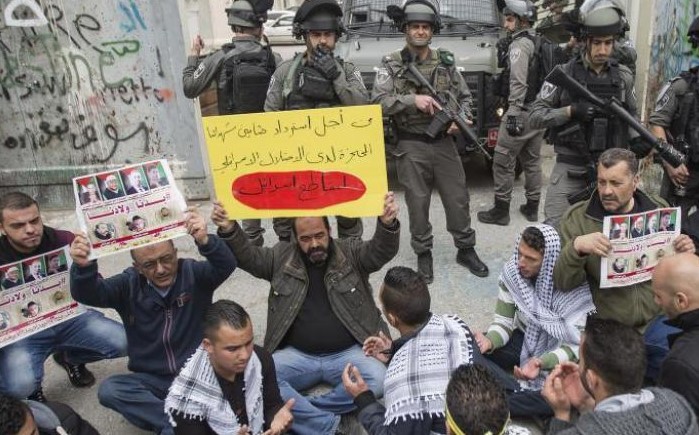According to B’Tselem figures, Israel is currently holding the bodies of at least 52 Palestinians who carried out attacks against Israelis, or whom the military claims attempted such attacks, and is refusing to return them to their families. This causes immense suffering to the families, as they are unable to bury their loved ones and perform the mourning rituals.

Relatives of Palestinians whose bodies are being held by Israel demonstrate for their release. (Photo: B’Tselem)
Holding the bodies of Palestinians as bargaining chips for future negotiations is a long-standing practice in Israel, but the policy has always been vague. At times, it seemed as though decisions were made in every case separately and on an ad-hoc basis in response to pressure put on the establishment and according to political considerations. At other times, Israel generally refused to return the bodies of Palestinians, while there were also times when Israel did return them. When the wave of attacks began in October 2015, Israel resumed its practice of holding onto the bodies of Palestinians who had perpetrated attacks or had been suspected of committing them. Some were returned to the families after being kept by Israel for several months.
It is not just the policy that is shrouded in ambiguity, but also the exact number of bodies Israel has held onto and returned since 1967. Various estimates put the number in the hundreds. According to information provided to the court in petitions concerning the seizure of bodies by the state, between 1991 and 2008, Israel made deals in which it handed over 405 bodies in return for the bodies of deceased soldiers.
On January 1, 2017, for the first time, the Security Cabinet passed a resolution entitled Uniform Policy on the Handling of Terrorist Bodies. The resolution states that, as a rule, “Terrorists’ bodies will be returned subject to restrictive conditions set by security officials”. However, the bodies of “terrorists associated with Hamas” and of “terrorists who perpetrated a particularly heinous terrorist attack” will be kept by Israel and not returned to their families.
The relatives of six Palestinians who perpetrated, or were suspected of perpetrating, attacks and whose bodies Israel refused to return filed a High Court petition against this decision.
The petition was accepted by the majority opinions of Justice Yoram Danziger and George Karra, with a dissenting opinion by Justice Neal Hendel. Justice Danziger found that Regulation 133(3) does not grant the state the power to hold onto bodies for the purpose of negotiations. Despite this finding, Justice Danziger stopped short of ordering the state to return the bodies to the families. Instead, he gave the state six months to pass a law that would allow it to hold bodies. If no such law is passed within this timeframe, the state will have to return the bodies to their families.
Rather than passing the law, the state filed a motion for a further hearing before an extended panel, arguing that the existing law allows it to hold bodies. The motion was granted and the extended panel presiding over the further hearing held (Hebrew), by majority opinion, that the existing law does, in fact, grant the state the power to hold bodies for the purpose of negotiations.
The lead judgment in the further hearing was penned by Supreme Court President Justice Esther Hayut, with concurring judgments, using similar arguments, by Justice Neal Hendel, Yitzhak Amit and Noam Sohlberg. Justices Uzi Vogelman, George Karra and Daphne Barak-Erez gave dissenting opinions.
B’Tselem has written that “Over the years, Israel’s Supreme Court has validated nearly every human rights violation perpetrated by Israel in the Occupied Territories. In doing so, it has relied on unfounded legal interpretation that empty the principles of international law designed to protect, even if minimally, people living under occupation from any real meaning. The Supreme Court has approved punitive house demolitions, lengthy detention without trial, the protracted blockade on Gaza imprisoning some two million people, the displacement of entire communities and the construction of the separation barrier on Palestinian land, to name a few. This judgment is yet another link in the chain.”
Instead, the justices elect, time and time again, to ignore the broader context in which these violations take place: a rigid military regime that has been in place for more than fifty years, governing an occupied population that has no political rights and no say in the most basic decisions affecting its life. These circumstances warrant enhanced protection for the population, yet the court uses its powers of judicial review to enhance the power of the state, including its use of draconian measures. In so doing, not only do the Supreme Court justices fail to discharge their duties, but they also play a pivotal role in legitimizing the entire occupation, which benefits from the seal of approval given to its inherent human rights violations by the highest judicial instance in the land.


